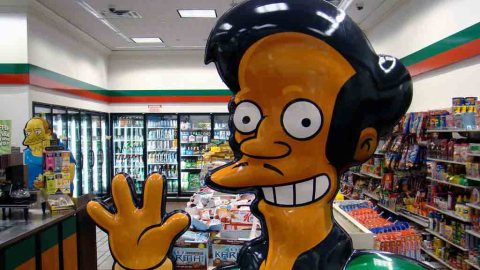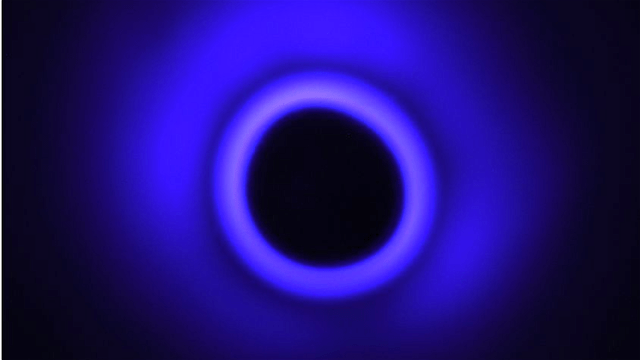The Problem With Apu: Indian-Americans Resist “The Simpsons” Character

It’s 1925 and you want chicken. As you’re driving around Salt Lake City you pass a new restaurant that fits the bill. The Coon Chicken Inn, featuring a smiling African-American porter as a logo—as well as a twelve-foot high “Coon head” entrance—also opened in Seattle and Portland, Oregon. The mini-chain kept those latter locations in operation until 1949, while the Utah original finally shut its doors in 1957 thanks to a growing public awareness that perhaps the imagery didn’t fit the nation any longer.
Now imagine the restaurant was still open today. The social pressure against such a racist operation would quickly be shut down. The billboards and menus remain in circulation in the black memorabilia market. Whoopi Goldberg owns one, as part of her “Negrobilia” collection. Yet she doesn’t see it as being blatantly racist; she believes it’s part of an ignorant white heritage that doesn’t understand black culture and so acts in a way they deem humorous.
Which, of course, is part of the problem with racism and its insidious process. If something makes us laugh, what’s the problem? While we’re currently experiencing an uncomfortable backlash against multiculturalism, we’re also in the midst of an incredibly powerful resistance fighting sexual harassment. Those professing a diverse ethnic and gender demographic are pushing forward progressive agendas, which makes you wonder: What about Apu?
At least that’s what actor and comedian Hari Kondabolu is asking in his new documentary, “The Problem with Apu.” Twenty-eight seasons ago Apu Nahasapeemapetilon was introduced as the owner of Kwik E-Mart in The Simpsons. He quickly became one of the show’s main punching bags, a trend that did not limit itself to the show. Being one of the first mainstream gateways into Indian culture, his character ended up hurting Indian-Americans and the representation of India broadly. As Kondabolu reports in a round-table with four other Indians, every one of them was bullied by being called Apu in their youth.
This trend is not limited to the documentary. As the NY Times reports,
In one sequence, the actor Aziz Ansari (“Master of None”) describes being in a car with his dad when a man drives up and asks them where the nearest Quik-E-Mart is. Dr. Vivek Murthy, the 19th surgeon general of the United States, talks about enduring the taunts of an Apu-imitating bully in the seventh grade. And Maulik Pancholy (“30 Rock”) recounts how much he hated going into 7-Eleven stores as a kid, lest his friends see an Indian store clerk and start doing “the Apu thing.”
Today many Indians and Indian-Americans enjoy prominent positions in our social consciousness: Ansari, certainly, but also Deepak Chopra, Amartya Sen, Kal Penn, Mira Nair, Fareed Zakaria, Vikram Gandhi—Norah Jones is half-Indian. There are other influential musicians: Tony Kanal is the co-founder of No Doubt; Sameer Gadhia heads up the California-based band, Young the Giant; Karsh Kale is one of today’s most prolific producers. Yet still, Apu remains.
Add to this the fact that Apu is voiced by a white man, Hank Azaria, who makes over $300,000 per episode for his work. (At the show’s peak, Azaria was making $440,000.) Azari has won three Primetime Emmys for his performance as Apu. While he expressed initial concern over being told to make the accent offensive, it has not stopped him from enjoying the fruits of the job’s rewards.
Despite all of this, Kondabolu doesn’t hate The Simpsons. In fact, he loves the show; he just hates Apu. Fellow actor Kal Penn feels differently. Since he can’t divorce the show and Apu, he never watches it. This sentiment is longstanding in Indian-American culture. In 2002 I interviewed the actor Ajay Naidu (Requiem for a Dream, Pi, Office Space) for Trace magazine, and he told me,
Right now it’s very easy for Indian people to be the butt of a joke because there’s not enough of a diaspora to stand up and yell, or an Anti-Defamation League strong enough within our community. Some of the greatest young filmmakers, musicians, poets, and dancers are South Asian. In a familial community like that, it really adds another dimension.
Dimensionality seems lost with Apu. Even Azaria admits it’s not a perfect accent. In fact, in a nation with over a billion people and hundreds of languages, it’s more of an amalgam of stereotypes than anything specific, which might be fine for a show on Fox. But for Kondabolu and other Indian-Americans the joke is beyond old. Perhaps his documentary is the equivalent of Naidu’s call for an ADL. Only time will tell, but for many, that time can’t come soon enough. As Kondabolu admits, Apu isn’t helping the people he supposedly represents:
There are a billion reasons to love The Simpsons and Apu was one of them. But when you sit in high school, which is, I think for most of us, the lowest point in our lives, you realize [Apu] was a tool for kids to go after you. And this was perfect, right? A caricature with this ridiculous accent that nobody has. And even though I grew up in Queens, I still had the same vulnerabilities, and my parents were accented. I thought: how are they going to view my parents, how are they going to view me?
—
Derek is the author of Whole Motion: Training Your Brain and Body For Optimal Health. Based in Los Angeles, he is working on a new book about spiritual consumerism. Stay in touch on Facebook and Twitter.





